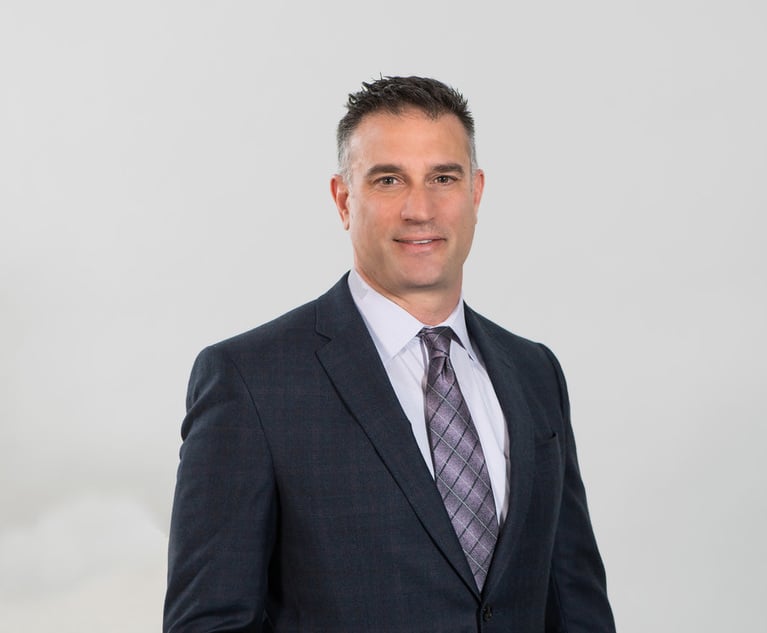Gifted Student's School-to-School Travel Doesn't Require District Transport
A walking school district is not required to transport a gifted student from middle school to high school in order for him to attend an accelerated class, the Commonwealth Court has ruled.
November 16, 2017 at 12:35 PM
4 minute read

A walking school district is not required to transport a gifted student from middle school to high school in order for him to attend an accelerated class, the Commonwealth Court has ruled.
A split en banc panel ruled Nov. 9 in Mt. Lebanon School District v. J.S. that without evidence to show that the half-mile walk between schools is unsafe or presents unusual complications, the district does not need to provide extraordinary transportation.
J.S., a seventh grader deemed gifted under the Pennsylvania Code, is allowed to attend geometry class at Mt. Lebanon High School, a two-year acceleration in math under his individualized education plan, President Judge Mary Hannah Leavitt wrote for the 6-1 majority. J.S. walks from his home to the middle school, then walks a half-mile to the high school for his first-period geometry class. The district, which does not provide any transportation to students unless they are disabled, does not provide him transportation to the high school but does drive him back to the middle school so he doesn't miss his second-period class.
J.S., through his parents, filed a due process complaint against the district asserting that the failure to transport him to the high school deprives him of an appropriate education in line with his education plan, despite the fact that he has received an “A” in each marking period for the class. A hearing officer concluded that the district is required to transport J.S. from the middle school to the high school each morning under Section 1374 of the Public School Code.
In appealing the order, the district argued that it has discretion under Section 1361 of the code to decide whether to offer transportation, as it has in deciding as a matter of policy to be a walking district.
J.S. asserted that Sections 1362 and 1374, construed together, require the district to transport a gifted student who is required to travel more than one-and-a-half miles to school each day, as he does when his route to the middle school is combined with his route to the high school.
Leavitt, reviewing Section 1374, said it indicates a district “may” decide whether to offer free transportation to a gifted child enrolled in an approved class, and if it elects not to, an “intermediate unit” is tasked with providing it. With that in mind, she said, there is no obligation to provide transportation. Section 1362, meanwhile, does not mandate free transportation, instead indicating that it “may be furnished” to a student residing more than one-and-a-half miles from his school. Considering the two sections in tandem, Leavitt said the hearing officer erred in ordering the school to transport J.S.
Leavitt also drew a distinction between the case at issue and the court's 1986 decision in Woodland Hills School District v. Department of Education, which the hearing officer relied on. The nature of the walking district in Mt. Lebanon made the Woodland Hills case inapposite, she said. J.S. also offered no evidence that he is physically unable to walk to the high school or that the route between the schools is unsafe, she said.
Finally, Leavitt said, construing Section 1374 to authorize but not mandate that a district provide transportation is in keeping with other provisions of the School Code.
“A court should not interfere with a school board's exercise of the discretion authorized in Section 1361 'unless the action was based on a misconception of law, ignorance through lack of inquiry into the facts necessary for an intellectual judgment, or unless the action is the result of arbitrary will or caprice,'” Leavitt said.
Given the lack of evidence that the district's policy was implemented in an arbitrary or capricious manner, the court “will not interfere with the district's exercise of its discretion,” she said.
Judge Joseph M. Cosgrove issued a concurring and dissenting opinion.
The case docket was sealed and information for counsel could not be obtained. The district's communications department did not respond to a request for comment.
This content has been archived. It is available through our partners, LexisNexis® and Bloomberg Law.
To view this content, please continue to their sites.
Not a Lexis Subscriber?
Subscribe Now
Not a Bloomberg Law Subscriber?
Subscribe Now
NOT FOR REPRINT
© 2025 ALM Global, LLC, All Rights Reserved. Request academic re-use from www.copyright.com. All other uses, submit a request to [email protected]. For more information visit Asset & Logo Licensing.
You Might Like
View All



Trending Stories
Who Got The Work
J. Brugh Lower of Gibbons has entered an appearance for industrial equipment supplier Devco Corporation in a pending trademark infringement lawsuit. The suit, accusing the defendant of selling knock-off Graco products, was filed Dec. 18 in New Jersey District Court by Rivkin Radler on behalf of Graco Inc. and Graco Minnesota. The case, assigned to U.S. District Judge Zahid N. Quraishi, is 3:24-cv-11294, Graco Inc. et al v. Devco Corporation.
Who Got The Work
Rebecca Maller-Stein and Kent A. Yalowitz of Arnold & Porter Kaye Scholer have entered their appearances for Hanaco Venture Capital and its executives, Lior Prosor and David Frankel, in a pending securities lawsuit. The action, filed on Dec. 24 in New York Southern District Court by Zell, Aron & Co. on behalf of Goldeneye Advisors, accuses the defendants of negligently and fraudulently managing the plaintiff's $1 million investment. The case, assigned to U.S. District Judge Vernon S. Broderick, is 1:24-cv-09918, Goldeneye Advisors, LLC v. Hanaco Venture Capital, Ltd. et al.
Who Got The Work
Attorneys from A&O Shearman has stepped in as defense counsel for Toronto-Dominion Bank and other defendants in a pending securities class action. The suit, filed Dec. 11 in New York Southern District Court by Bleichmar Fonti & Auld, accuses the defendants of concealing the bank's 'pervasive' deficiencies in regards to its compliance with the Bank Secrecy Act and the quality of its anti-money laundering controls. The case, assigned to U.S. District Judge Arun Subramanian, is 1:24-cv-09445, Gonzalez v. The Toronto-Dominion Bank et al.
Who Got The Work
Crown Castle International, a Pennsylvania company providing shared communications infrastructure, has turned to Luke D. Wolf of Gordon Rees Scully Mansukhani to fend off a pending breach-of-contract lawsuit. The court action, filed Nov. 25 in Michigan Eastern District Court by Hooper Hathaway PC on behalf of The Town Residences LLC, accuses Crown Castle of failing to transfer approximately $30,000 in utility payments from T-Mobile in breach of a roof-top lease and assignment agreement. The case, assigned to U.S. District Judge Susan K. Declercq, is 2:24-cv-13131, The Town Residences LLC v. T-Mobile US, Inc. et al.
Who Got The Work
Wilfred P. Coronato and Daniel M. Schwartz of McCarter & English have stepped in as defense counsel to Electrolux Home Products Inc. in a pending product liability lawsuit. The court action, filed Nov. 26 in New York Eastern District Court by Poulos Lopiccolo PC and Nagel Rice LLP on behalf of David Stern, alleges that the defendant's refrigerators’ drawers and shelving repeatedly break and fall apart within months after purchase. The case, assigned to U.S. District Judge Joan M. Azrack, is 2:24-cv-08204, Stern v. Electrolux Home Products, Inc.
Featured Firms
Law Offices of Gary Martin Hays & Associates, P.C.
(470) 294-1674
Law Offices of Mark E. Salomone
(857) 444-6468
Smith & Hassler
(713) 739-1250





